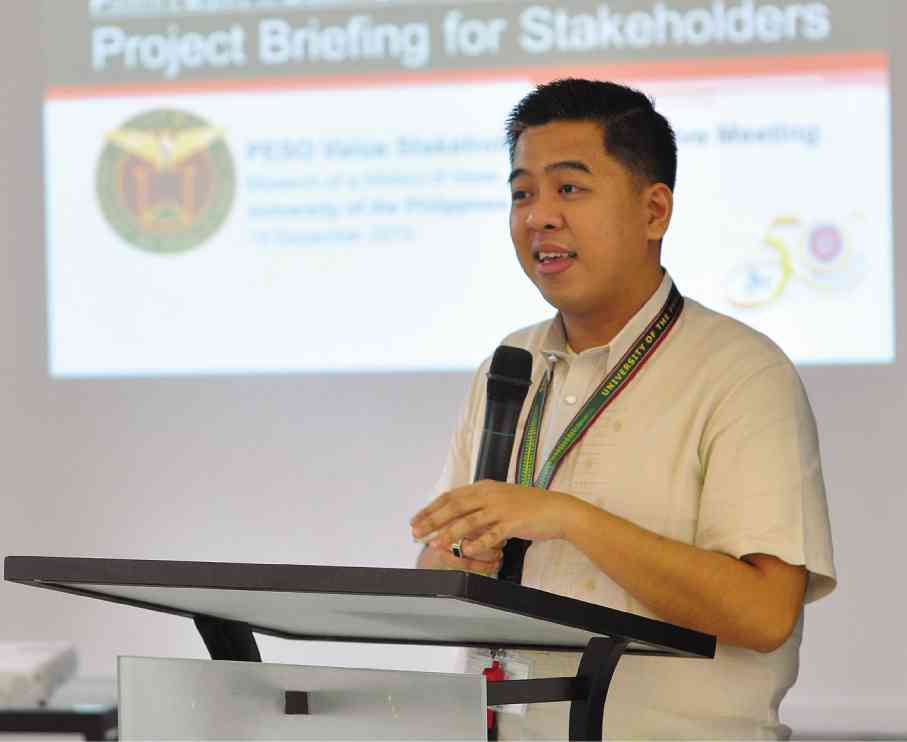Lessen costs for treating cancer and mental disorder, UP docs urge

ANTONIO: We need to develop models of healthcare financing that will appropriately support long-term treatment.
Patients diagnosed with colorectal cancer or schizophrenia will not only have to adhere to a long-term treatment plan but also have to prepare themselves—and their family—to the physical, emotional and financial stress that their condition brings.
Since a number of different approaches are often required to deal with colorectal cancer—chemotherapy, radiation as well as surgery—the patient will need the help of several specialists including a medical oncologist, who will be in charge of the medical treatment and chemotherapy; radiation oncologist, who will supervise the radiation therapy; and a surgeon, who will be in charge should a cancerous polyp be removed or if already extensive, the removal of the affected portion of the colon.
The same situation exists to effectively manage schizophrenia as the patient will need the support of a psychiatrist, psychologist, mental health nurse, and in some instances a social worker or other support workers.
The schizophrenic patient will also need individually tailored combination of, oftentimes, expensive medications.
Challenges
“Imagine the challenges faced by these patients that require long-term care and hospitalizations. The advocacy program Patient’s Equity to Support “Out-of-Pocket Expense” Value (Peso Value project) aims to minimize these difficulties,” said Dr. Carl Abelardo Antonio, the project’s team leader.
Regarded as the first health economics project in the country, the Peso Value project is initiated by a team from the College of Public Health of the University of the Philippines (UP) Manila and Johnson & Johnson Philippines Inc. (JJPI).
The project’s proponents noted that even if state health insurance agency PhilHealth has increased its reach—covering 85 percent or about 90 million Filipinos—its benefits could only insure a fraction of the total cost of the bill.
The study revealed that more than 50 percent of the total healthcare costs of patients are still out-of-pocket expenses.
Consultative meeting
To find ways to reduce the patients’ treatment costs, the project proponents recently organized a stakeholder consultative meeting at the UP Museum of a History of Ideas in Manila.
The event gathered stakeholders from the government, academe, medical societies, health maintenance organizations, and patient groups who willingly shared their inputs and raised questions pertaining to the project.
“We need to develop models of healthcare financing that will appropriately support long-term treatment, identify and test the most appropriate and feasible model for the Philippine healthcare system; and endorse the model to the government to come up with policies that will help improve access of the Filipino patients to quality medicines,” Antonio said.
Initial focus
The pilot advocacy project has decided to initially focus on the two health conditions considering that colorectal cancer is one of the top six types of cancer in the Philippines while schizophrenia is among the top mental disorders affecting Filipinos who seek consultation and treatment in hospitals in the country.
“Both conditions require long-term care and we’d like to find feasible and viable financing alternatives. Since foster care is not yet covered by a lot of insurance, we’d like to find ways how to lighten the expenses incurred by families in caring for these patients,” Antonio said.
The recent stakeholders’ consultative meeting provided an avenue for stakeholders to give their insights in creating an ideal model of healthcare system that is more appropriate to the needs of our patients.
The Peso Value project complements the recent effort by PhilHealth that was passed in November, a new benefits package for colorectal cancer, and has ongoing efforts to develop a mental health benefits package.
Committed
JJPI informed that as the project’s supporter, the company has committed itself to continually explore new ideas, new initiatives, new treatment options, new devices, new products and projects that will help change the lives of patients.
Through these innovative initiatives like the Peso Value advocacy project, JJPI hopes to transform the country’s healthcare industry to a more responsive and more caring healthcare system, addressing the needs of every Filipino patient.
Antonio, who said the gathering is just the first of many engagements scheduled, wanted to ensure that all persons and organizations who will be affected, or who can affect the financing of treatment for schizophrenia and colorectal cancer be able to contribute in shaping the direction of the project.
He said: “The stakeholders would like to eventually know the optimal mix of financing strategies that would prepare the patients and their families so that they won’t fall into financial ruin. These two illnesses are just our entry points. The findings can be applied to some other conditions.”
